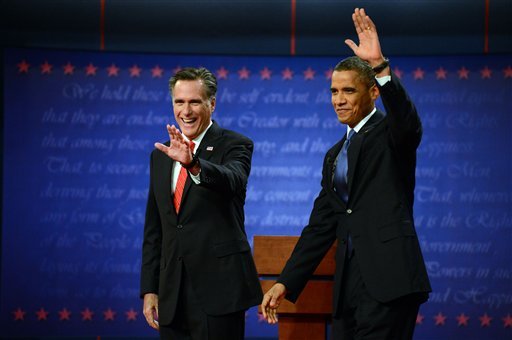The Republican National Committee’s warning shot to the committee that organizes presidential debates every four years reflects former President Donald Trump’s continued grip on the GOP.
In a letter sent to the Commission on Presidential Debates on Tuesday, RNC Chairwoman Ronna McDaniel laid out a series of changes she said would ensure the impartiality of debates. McDaniel cited several rules and pieces of logistics she said disadvantaged Trump in the two debates in which he squared off against Joe Biden, then the Democratic nominee.
The letter says the to-be-determined 2024 GOP nominee might not participate in debates absent rules changes. It also fueled speculation Trump could run again in 2024.
MIKE PENCE DELIVERS SPEECH EMBRACING TRUMP AND ‘MAGA’ AGENDA DESPITE RIFT OVER CAPITOL RIOT
“It was basically kind of a proxy letter from President Trump,” said Aaron Kall, director of debate for the University of Michigan. “So, yeah, he continues to be the standard-bearer of the party, and if he’s going to run again, debates are very important.”
Among the concerns McDaniel raised in her letter included the choice of having C-SPAN host Steve Scully moderate what would have been the second debate, though Trump pulled out after it was set to take place virtually due to COVID-19 concerns.
Scully had been an intern for Biden decades ago and lied about being hacked on Twitter after he reached out to former White House communications director Anthony Scaramucci for debate advice.
“It came as little surprise to Republicans then when Mr. Scully accidentally revealed that he was seeking advice on how to attack the president from one of his fiercest critics,” McDaniel wrote.
McDaniel also pointed out that the debate commission installed Plexiglas shields to enhance public health measures, which would allow the candidates to see their reflections once the stage was lit. The chairwoman credited Trump’s realization of the potential distractions, citing his television background.
But some say the focus on Trump is likely to distract from the general concerns raised by the party, alleging that debates skew in favor of the Democratic nominee.
“We need to make sure the commission’s fair for all elections moving forward, not just worrying about the past or the next election where Donald Trump might run for president. And it seems like, to me, the letter was written more to Donald Trump than it was to the commission,” a Republican strategist told the Washington Examiner.
Among the changes the RNC is requesting include setting term limits for the commission’s Board of Directors, hosting at least one debate prior to the start of early voting in any state, and disqualifying any potential moderators who have a perceived notion of a political, professional, or personal bias.
The committee is also asking the commission to consider a code of conduct that prevents its staff from publicly engaging in partisan activity or making comments that endorse or oppose a candidate and to impose penalties for the violation of such proposed guidelines.

The future of debates
The commission was first established in 1987, working as a nonpartisan organization to host debates with major-party presidential and vice presidential candidates.
Debates in themselves have been a functioning aspect of the country’s election cycles since the mid-1800s, tracing back to seven three-hour debates for the Illinois Senate race between Abraham Lincoln and Stephen Douglas.
The first televised presidential debate took place in the 1960 election between John F. Kennedy and Richard Nixon. Debates disappeared for the next three election cycles, but since 1976 have been a traditional tool to help the electorate in decision-making.
Kall said the RNC’s letter exemplifies the importance debates still hold in presidential elections, even in an increasingly polarized era in which they may not be as influential for voters as they were previously.
“The fact that they’re worried about the nuances of [the] rules of debate that’s not going to happen until the fall of 2024 this early in advance I think still shows the power of debates,” Kall said.
Ed Lee, senior director of the Alben W. Barkley Forum for Debate, Deliberation, and Dialogue at Emory University, said he believes it’s unlikely the importance of presidential debates will fall in the near future, even with the threat of nominees not participating.
CLICK HERE TO READ MORE FROM THE WASHINGTON EXAMINER
“If the notion of presidential debating goes away, I think that it says much more about the direction of the overall politics in this country are heading than it will say anything about the presidential debates,” Lee said. “It has such a storied tradition in who we are and what we do.”
